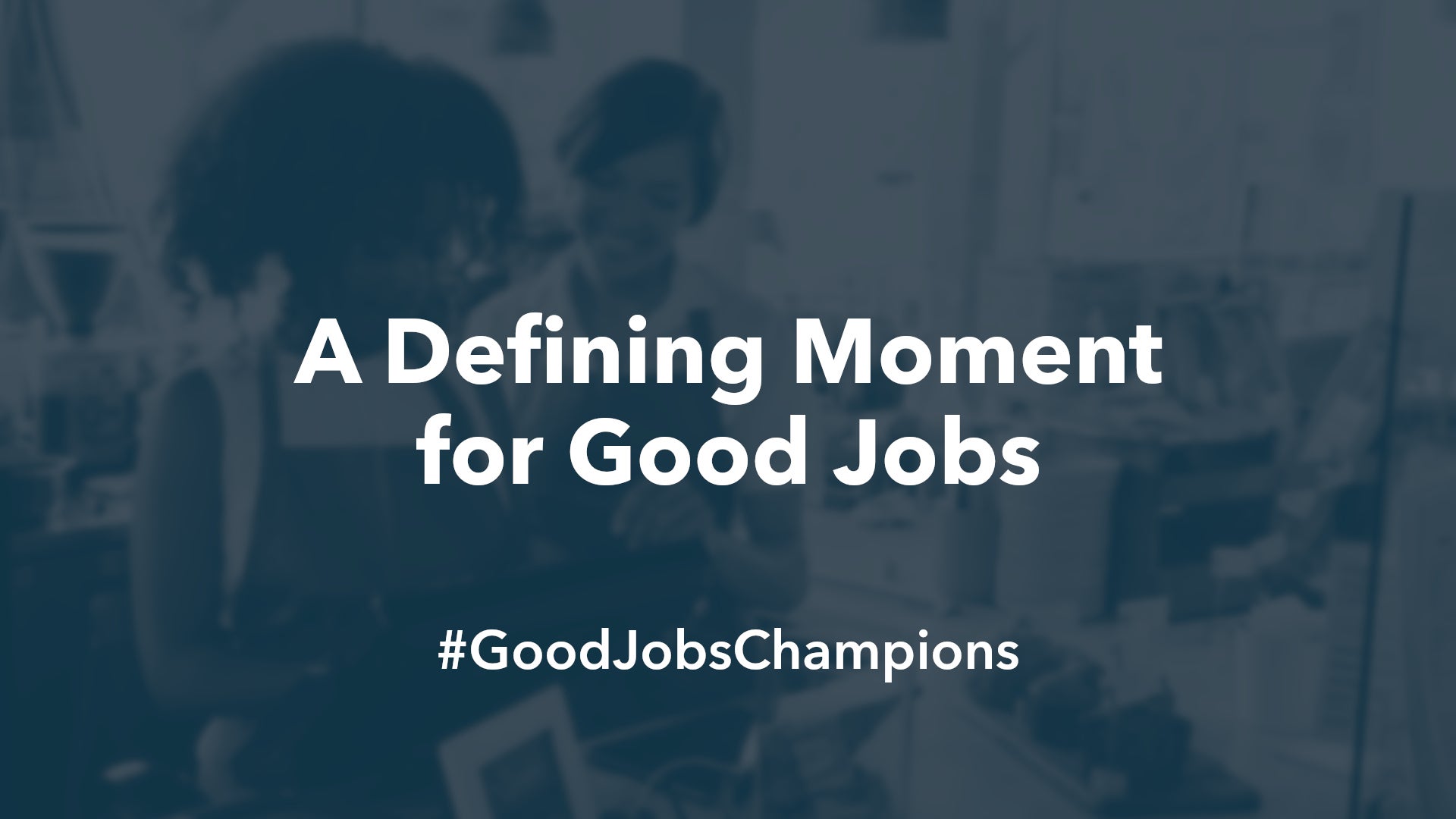Quotes from Signatories
The Statement on Good Jobs signatories represent leaders working across public and private sectors nationwide who recognize the urgency and potential to advance good jobs. Hear from some of these leaders on why the shared definition and action on good jobs are so important.
Maureen Conway, Vice President, The Aspen Institute; Executive Director, The Aspen Institute Economic Opportunities Program:
“Good jobs are crucial for people to live with dignity, and they are also good business – we don’t need to keep trading off one for the other. We are pleased to co-lead this effort to introduce a broadly shared job quality definition and action plan that aligns the interests of employers, workers, and other stakeholders so we can finally address our broken system of work together.”
Rachel Korberg, Executive Director, The Families and Workers Fund:
“Hard work should add up to a decent quality of life, but for too many that promise is broken. While a definition alone can’t fix the problem, today marks a critical step forward in centering job quality in our policies, business practices, and investment strategies.”
Damien Dwin, Founder and CEO, Lafayette Square:
“As an investor, we know that a thriving and healthy workforce is critical to business productivity and long-term success. Through Worker Solutions—a platform to enhance financial, health, and career outcomes for workers—we encourage companies to improve job quality by making workplace benefits more accessible and offering impactful services. We are excited to use this ‘good jobs’ framework to encourage other investors and businesses to drive meaningful impact for their workforce and communities.”
Paul Osterman, Nanyang Technological University (NTU) Professor of Human Resources and Management, MIT Sloan School of Management:
“Good jobs are essential for good lives. Our great challenge is not simply creating jobs but assuring that they are good and, by the same token, upgrading the quality of existing work. We have the tools to achieve these goals but need to come together and build the will to move forward.”
Dr. Michael McAfee, President and CEO, PolicyLink:
“Winning on equity – building a thriving economy and a multiracial democracy that works for all – is the work of our generation. Ensuring that all jobs are good jobs and that everyone who wants to work has access to dignified, empowered, high-quality employment is a critical ingredient to finally realize the promise of equity.”
Michael Lastoria, CEO, &pizza:
“Our focus has always been on providing good jobs and economic stability. It is the single clearest way to say to our workforce, ‘we value you.’ This renewed focus on the standardization of good jobs is critical to ensure the restaurant industry can attract workers and helps us all meet the moment. All of our work counts for nothing if our people cannot live on the jobs we provide them with.”
Darren Walker, President, Ford Foundation:
“Advancing good jobs is key for companies to both do better and be better. Defining what makes a good job is a critical achievement, one that will help shape an economy centered on both profits and people. Now companies must inject meaning into that definition, by investing fully in their workers, with wages, benefits, and a voice over their conditions. It’s not only the right thing to do; it’s smart business.”
Laurie Siegel, Board Member, Lumen and FactSet; Independent Consultant; former Chief Human Resources Officer, Tyco International:
“The pandemic made evident that every level of employee matters. Companies that value their workforce and embrace the types of practices called for by the Good Jobs Champions Group will reap the benefits of engaged, productive employees who contribute to more successful and resilient businesses in the long-term.”
Ai-jen Poo, President, National Domestic Workers Alliance:
“We must care for the people who care for us. Workers have been clear that what they need and deserve is fair pay that they can live on; access to benefits that enable a stable, healthy life and paid time off; a fair chance to get ahead; and respectful, equitable treatment.”
Maria Flynn, President and CEO, Jobs for the Future:
“The future of the education, training, and workforce systems must be a future of advancing good jobs for all — especially women, Black and Latinx people and indigenous communities who have been overlooked in the past. Students and learners are doing their part in developing their skills and talents to plan for their futures and contribute to the success of the companies employing them. We must ensure the jobs they take on also provide the opportunities they need to survive and thrive.”
Bulbul Gupta, President and CEO, Pacific Community Ventures:
“Half of the country’s workforce is employed by a small business. Small business owners want to provide good employment opportunities for workers, but are often uncertain of how to do so in ways that make sense for their business. We are proud to partner with the Good Jobs Champions Group in our ongoing work to provide practical tools, resources, and partnership to small businesses in their work to improve job quality, as a pathway to racial and gender wealth building in the US.”
Amanda Cage, President and CEO, National Fund for Workforce Solutions:
“The National Fund believes that an equitable economy is one where all jobs are good jobs – where companies think as seriously and deeply about job quality as they do about product quality or service quality. Over the past decade, we have collaborated with employers and workers to improve job quality in the workplace – creating practical tools and resources for the field – and are very encouraged to see this work proliferate throughout the country.”
Gerald Chertavian, CEO, Year Up:
“Year Up works closely with business leaders across sectors to increase access to good jobs for young adults without college degrees, and this definition will be a valuable asset as we look to dramatically scale that access through the Year Up program and influence corporate talent practices through our Grads of Life platform in the next five years.”
Priscilla Sims Brown, President and CEO, Amalgamated Bank:
“Creating a common definition of good jobs that is inclusive of equity, respect and voice, as well as economic stability and advancement, is a great step in the right direction. As a successful Bank with a hundred-year track record as a pro-worker company, we believe good jobs are a bedrock of a successful and sustainable economy.”
Don Howard, President and CEO, The James Irvine Foundation:
“A shared definition of what constitutes a good job is important to ensure all low-wage workers have the power to advance economically. Business models that under-value and under-pay workers, often in unsafe conditions, are feeling the pressure as workers demand better quality jobs – higher wages and more. A first step is agreeing on what a good job is, then documenting the positive impacts of quality jobs on workers, employers, and our economy.”






